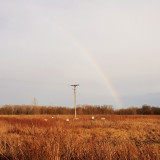Invisible Children
-
Poet on the Piano
16 years agoThanks to my best friend, I recently watched three documentaries that Invisible Children have created and this is the saddest thing, Joseph Kony the president abducted children from villages, from as young as six, and trained them to kill. These children handled weapons and were basically brainwashed. They had to brutally kill and if they refused they would suffer, and those around them would also. Children of Africa now live in fear of the Rebels and that the child soldiers will come and take them away. Because of the young age, killing and weapons is all that is on the child's mind after a while. They have nothing else, they perfectly now how to aim and innocently murder. All they see in front of them is blood
And Kony would not just kill but at times he would cut off a child's body part or cut off their nose or mouth. I have seen pictures of this, proof, and it is horrible. So many children have grouped up and hid away in hospitals. We MUST stop Joseph Kony and return peace to Africa.
They look up to America, they pray to God we will save them and the thing is, through all this war, they still have faith and hope. God bless them..
What Invisible Children Is: (taken from invisiblechildren.com)
"We are story tellers. We make documentaries about war-affected children in east Africa and tour them around the world.
We use the power of media to inspire young people to help end the longest running war in Africa. Our model has proven effective, and hundreds of thousands of people have been called to action through our films and the volunteers that tour them.
We are made up of a tireless staff, hundreds of full time volunteers, and thousands of students and supporters. We are young, we are citizens of the world, we are artists, activists, and entrepreneurs. This fall, we are using our voice to ask President Obama to spearhead efforts to bring peace to Northern Uganda. We are mobilizing a generation to capture the attention of the international community, and make a stand for justice in the wake of genocide.
But our work extends far beyond storytelling.
With the support we receive from our tours and young supporters, we are able to implement cutting edge programs on the ground in Uganda. To prioritize and understand the needs of the community, our Uganda staff is 95% Ugandan. We focus on long-term development, working directly with individuals and institutions, to best understand the needs of these war-effected areas. We rebuild schools devastated by war, benefiting over 8,400 Ugandan youth in the areas of water and sanitation, books and equipment, refurbishment of structures, teacher support, and technology and power. We provide 690 scholarships to specifically chosen secondary students and 180 full ride scholarships to University. We employ mentors that holistically oversee healthy development for our students. We have also implemented micro-economic initiatives that are impacting 360 Ugandan�s in transition from internally displaced camps to their original homes as well as 13 formerly abducted child mothers who are now self-sufficient through our tailoring center that provides training in savings, investment, numeracy, literacy and health. These savings-and-loans initiatives have allowed villagers to save money and earn interest for the first time, freeing them to start their own businesses and provide for their families like never before.
We believe that the problems of central Africa need to be tackled comprehensively, from peace to education. Solving them is no easy task, and it will take all of us doing all that we can to ensure it. Join us in the race for peace, click here to find out what you can do to get involved."
UGANDA TODAY
"Since Invisible Children: Rough Cut was filmed in 2003, night commuting has ended for the children of northern Uganda. In recent years peace was seemingly within reach, largely due to the Juba Peace Talks. From June 2006 to March 2008 in Juba, Sudan, the Lord's Resistance Army (LRA) and the Government of Uganda (GoU) engaged in a series of peace talks in order to end the conflict. These peace talks, supported by special envoys from the United States and other nations, allowed for the longest period of peace in northern Uganda's 23-year war.
The Juba Peace Talks developed with hope for a lasting resolution, and concluded in March of 2008 with the Final Peace Agreement (FPA) ready for the signature of Joseph Kony and President Museveni. However, in April of 2008, Kony twice failed to appear and sign the FPA and officially ended the Juba talks mediated by the Southern Sudanese government. Joseph Kony's stated reasons for not signing the FPA were a vague understanding of the treaty's systems regarding post-conflict justice and an apprehension toward ICC warrants for him and four other LRA leaders. Since the collapse of the peace talks, the LRA has been active in the Democratic Republic of Congo (DRC), Central African Republic (CAR) and southern Sudan, drawing widespread disapproval from the international community and igniting a new urgency to end what has become a complex regional conflict.
In the last two years, an estimated 900,000 of the 1.8 million displaced have returned to their homes. But that leaves one million people currently living in the Internally Displaced Persons (IDP) camps. While the majority desires to return home, the issues surrounding their return are complex. Some have been displaced for more than a decade, and their former way of life is all but gone. Access to clean water, economic opportunities, health centers, and education are a pressing concern for all, and even more so for the many who contemplate returning to resource-barren villages."
PLEASE VISIT INVISIBLECHILDREN. COM AND HELP SUPPORT THIS LIFE-CHANGING MESSAGE THAT ITS PEOPLE ARE CARRYING OUT, STOP FIGHTING AND START TALKING.
PEACE PEACE PEACE PEACE PEACE PEACE PEACE PEACE -
Poet on the Piano
16 years agoWe need to act and reach out to others, we can't just argue and say, "We first must help OUR country" because then no one will help Africa or other places.
I just wanted to give that article to inform and inspire, and I hope you also will spread the news of Invisible Children and how you can act and sponser. -
forevertobeart
16 years agoWhile we're helping all these other countries, who's helping us?
-
Poet on the Piano
16 years agoI am pretty sure their need is far greater than our need, we need to out to others first, put them above our needs. I am not saying not to help our country also, obviously, but we cannot use that as an excuse. God wants us to help all, I hope I have made sense.
:) -
forevertobeart
16 years agoI understand what you are saying, I am in no way against helping other countries, especially ones such as Africa. I am only saying that we so badly want to help all these other countries when we can't even help ourselves, and nobody seems to want to either (can't blame them there.)
Anyway, happy holidays. -
Poet on the Piano
16 years agoI see what you are saying, thank you for posting.
You also my friend!
Merry Christmas Eve! -
stormingdance (Lessa Herron)
16 years agoWhile they have great need, we DO need to help ourselves first. If we keep giving until we run out of our own resources, who is going to be there to help us?
-
stormingdance (Lessa Herron)
16 years agoI wasn't talking JUST money. While the US government thinks money is infinite, they certainly can't think our other RESOURCES are. Fuel, food, health care, metals, other building materials, etc. We need a better way to sustain ourselves before we can build elsewhere.


